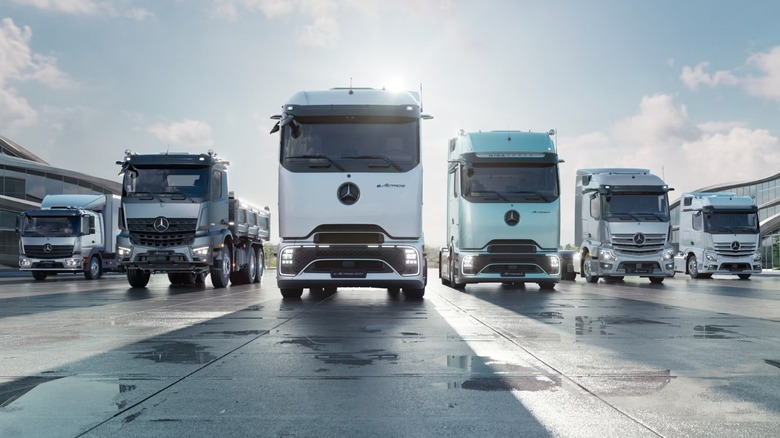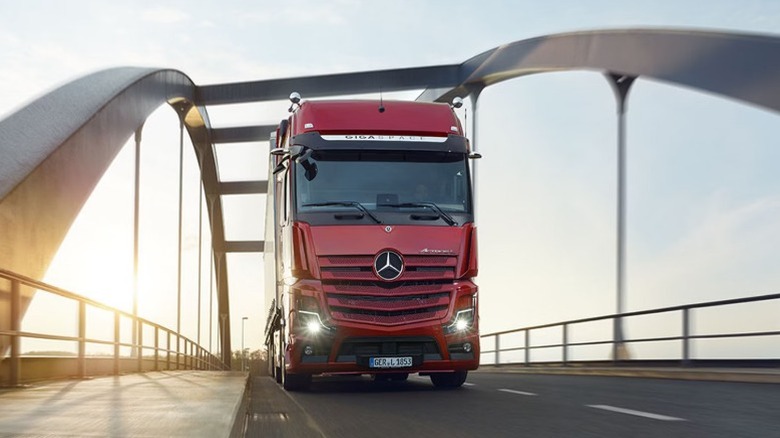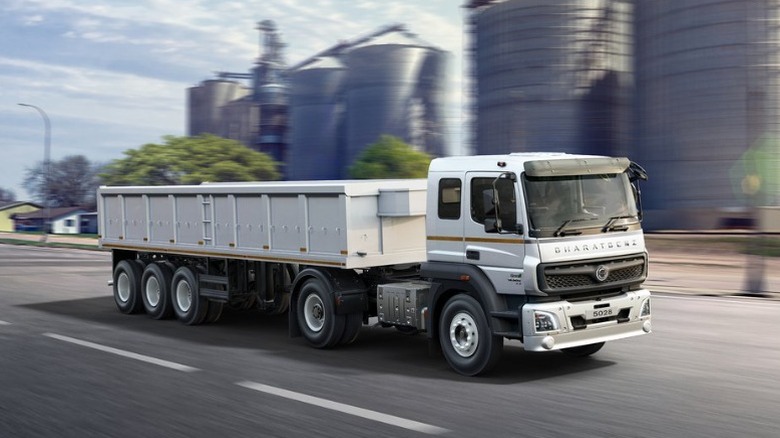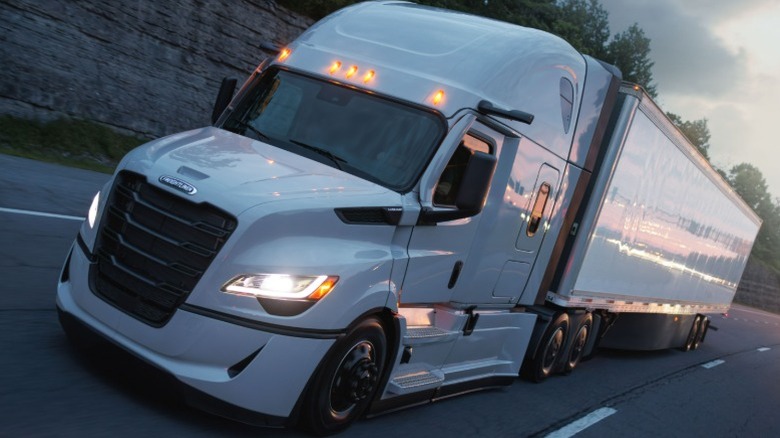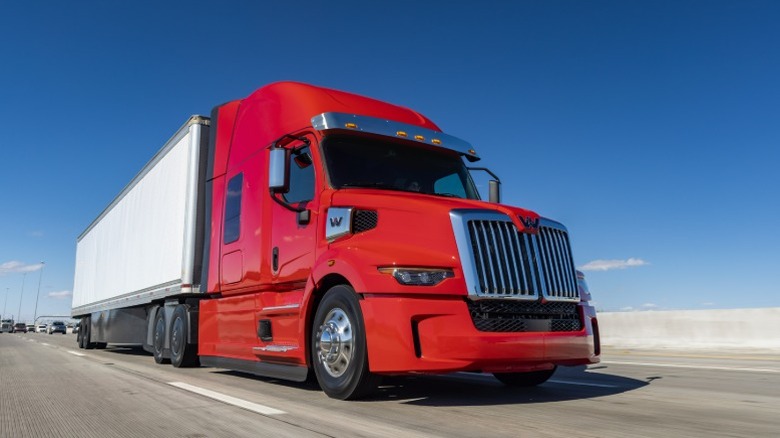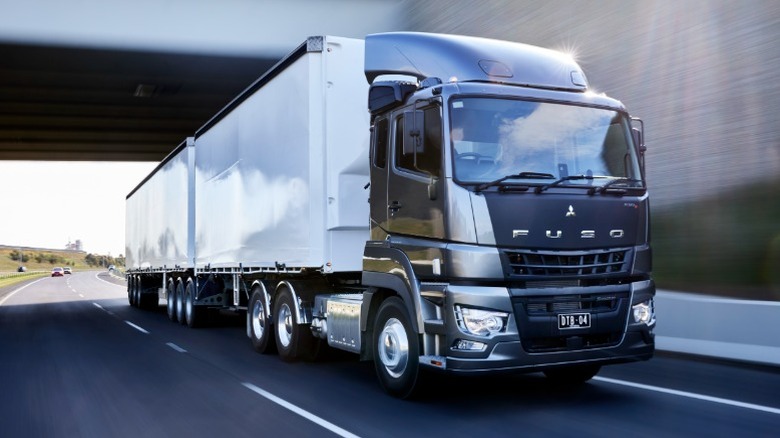5 Semi Truck Brands Owned By Daimler
The name Daimler is indelibly associated with the automobile. Gottlieb Daimler essentially invented the modern gas engine, paving the way for the motorcar as we know it, and Daimler Truck is a direct continuation of that heritage. Founded in 2019 as a subsidiary of Daimler AG — the brand that owns Mercedes-Benz, now known as the Mercedes-Benz Group — before being spun off as its own company in 2021, Daimler Truck is currently the world's largest manufacturer of heavy vehicles and buses.
Similar to other large companies such as Traton, owner of semi-truck brands like Scania and MAN, Daimler Truck has a handful of heavy vehicle brands under its ownership across North America, Europe, and the Far East. Mercedes-Benz Trucks is an expectedly big part of the Daimler Truck business, given its history with Daimler AG. However, the company also owns the well-known American trucking brand Freightliner and the Japanese truck manufacturer Fuso, alongside a few other brands.
Before we dive into the semi-truck brands that Daimler owns, it's worth noting that the German corporation also has a hand in semi-truck parts and servicing. Daimler Truck North America (DTNA) also owns Detroit Diesel, makers of the 500-hp DD15 diesel engine, DTNA Parts — which manufactures components for DTNA brands Freightliner and Western Star — and Elite Support, a network of service agents for said DTNA subsidiaries. Buses are also a big part of the Daimler Truck empire, and it even has a financial services arm that helps companies transition to zero-emissions logistics.
Mercedes-Benz Trucks
While Daimler Truck is a young company, Mercedes-Benz itself has been involved in trucks since the beginning — or so the company claims. Gottlieb Daimler allegedly built the world's first-ever truck in 1896, and Mercedes-Benz can arguably lay a claim to being the direct descendant of that heritage, having been established via a 1923 merger between Daimler Motoren-Gesellschaft and Benz And Cie. You might recognize them as the makers of the Patent Motorwagen, often considered the first car ever invented.
When Daimler AG established Daimler Truck in 2019, it split the Mercedes-Benz empire into separate car and heavy vehicle concerns. Mercedes-Benz continued building vans and cars, while Daimler Truck AG controlled the entirety of its parent corporation's truck and bus business, including Mercedes-Benz Trucks. Mercedes-Benz Trucks, the top-selling heavy vehicle brand in Europe as of 2024, currently manufactures a range of heavy- and medium-duty vehicles, from on-highway semis, like its flagship Actros L and value-oriented Actros F, to ultra-heavy-duty vehicles like the Arocs, available versions capable of pulling up to 500 tons.
As with other titans of the trucking world, Mercedes-Benz also offers a few zero-emissions heavy trucks, joining the likes of Kenworth and Tesla in the EV semi space. Leading the charge is the eActros 600, which won the International Truck of the Year award in 2025. The eActros 600 is currently the brand's only electric semi, but other medium-duty EV trucks, such as the eArocs 400 and eActros 300, indicate that the company is serious about zero-emissions freight and logistics.
BharatBenz
Mercedes-Benz Trucks has regional subsidiaries in Ireland and the U.K., but we have to turn to India to find the only one of its endeavors that stands alone as its own brand. BharatBenz goes back to Daimler's 2008 attempt to establish an Indian trucking presence through a joint venture with Indian corporation Hero Group. The resulting venture, Daimler Hero Motor Corporation Ltd., was to produce commercial vehicles, including heavy-duty trucks; However, an economic downturn led to Hero pulling out just a year later.
Daimler stuck to its guns, though, reclaiming Hero's 40% stake, and eventually launching BharatBenz in 2011. Unlike the ill-fated Daimler Hero Motor Corporation, BharatBenz was all Daimler, with the German corporation investing 4,400 crore rupees ($568 million or so at current exchange rates, not accounting for inflation) to build a facility in Oragadam, near the Indian city of Chennai. BharatBenz unveiled its first heavy-duty truck in January 2012, basing it on Mercedes-Benz's then-current Axor platform, with light- and medium-duty trucks debuting a couple of months later, in March.
At the time, BharatBenz was hailed as Daimler's largest greenfield investment outside of Europe, and the brand has continued to be an integral part of Daimler's projects. The company currently offers multiple variants of the HDT T tractor-trailer for the Indian market, with a range of other models, from heavy-duty tipper trucks (the HDT RT and HDT C) to medium-duty offerings like the MDT.
Freightliner
In the world of American heavy trucking, the name Freightliner stands head and shoulders above the rest. It's one of the most popular semi-truck brands in America, with a 36% market share as of July 2024. And, while tariff-related uncertainty has negatively impacted the U.S. heavy truck market as a whole, we expect it to still be near the top.
Freightliner first emerged onto the American trucking scene in 1942, debuting with the Model 600. This was a groundbreaking truck, being the first heavy truck in the U.S. with an all-aluminum cab. Freightliner would continue its innovative streak, be it under founder Leland James' Consolidated Freightways — it introduced the first-ever 90-degree tilt cab in 1958 — or under Daimler, which acquired Freightliner for $225 million in 1981 (just under $800 million in today's money). Under Daimler, Freightliner became the first heavy-duty truck manufacturer to introduce ABS in the U.S. In 2015, Freightliner debuted the world's first autonomous semi-truck, named Inspiration while 2023's SuperTruck II showcased ways to reduce freight emissions and improve efficiency through cutting-edge tech.
Of course, there's more to Freightliner than these headline-grabbing efforts. The company builds a range of heavy-duty, medium-duty, and vocational trucks, including the ever-popular Cascadia semi-truck. It also has natural gas and EV variants of its trucks available, with the eCascadia debuting in 2022 with an electric Detroit ePowertrain under the hood.
Western Star
Daimler Truck North America has a few brands under its wing, but only two of those make semi-trucks. Freightliner is one, and the other is Canadian firm Western Star, which Daimler (then DaimlerChrysler) acquired via Freightliner in 2000 for roughly $450 million. The purchase also included Orion Bus Industries, which Daimler later absorbed in 2006 and discontinued in 2012. That's a story for another time, though.
Western Star is a relatively young brand compared to many of the biggest names in heavy trucks, having been established in 1967. The firm, first founded as an offshoot of the White Motor Company, focused on serving truckers and logistics providers in the western U.S. and Canada with powerful yet light trucks. White Western Star, as it was then known, eventually established itself in the world of ultra-heavy-duty trucking, with the mining and logging industries favoring its vehicles. Sadly, Western Star couldn't keep its parent company afloat; Volvo purchased White's bankrupt U.S. operations in 1980, while Western Star was split between Canadian firms Bow Valley Resources and Nova Corporation.
Western Star established an Australian subsidiary in 1983 and kept updating its fleet over the following two decades. The company was doing quite well at the turn of the millennium, selling 8,000 vehicles and posting $900 million in revenue in 1999 — going some way to explain DaimlerChrysler's 2000 acquisition. Daimler moved Western Star production to Portland, Oregon, in 2002, where it still builds heavy-duty trucks like the surprisingly fuel-efficient 57X semi and the 49X heavy-duty vocational truck.
Fuso
Fuso, technically the Mitsubishi Fuso Truck and Bus Corporation (MFTBC), is one of the younger names under the Daimler Truck umbrella, at least in its current incarnation. But while MFTBC has only existed since Mitsubishi spun off the company in 2003 and allowed Daimler to acquire a 43% stake, the Fuso name has been present in the Japanese truck market since the early 20th century.
The Mitsubishi B46 bus, known as the Fuso, debuted in May 1932, followed by Mitsubishi's first proper truck in 1941. The Fuso Motors Sales Company, later named Mitsubishi Fuso Motor Sales Company, was then established in 1949. 1955 saw Fuso launch Japan's first-ever heavy-duty truck, the T33, kicking off a range of trucks and buses under Mitsubishi's ownership. It even expanded into Australia in the 1970s, with all of these efforts under Mitsubishi's ownership eventually culminating in the 2003 spin-off we mentioned earlier.
Daimler expanded its share of Fuso in 2011, paying the equivalent of $351 million to bring its stake in the Japanese truckmaker to just under 90%. This was the same year that Fuso unveiled its first hybrid heavy-duty truck, and the brand has followed the industry-wide push into reduced- and zero-emissions vehicles in the years since. Alongside heavy-duty trucks like the Super Great and Australian-market Shogun, Fuso also offers the light-duty EV eCanter. In June 2025, Daimler and Toyota announced that they would merge their truck subsidiaries Fuso and Hino, respectively, with the intention of forming a new holding company by April 2026.
